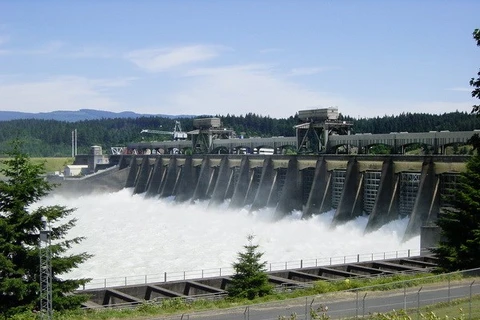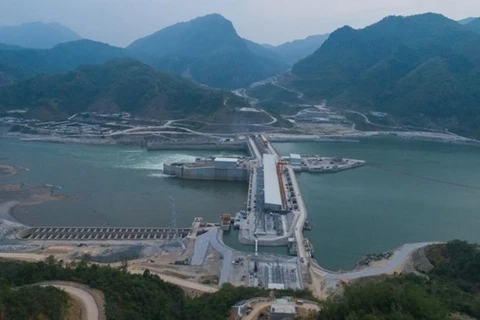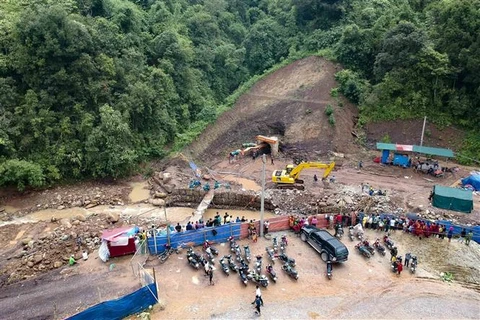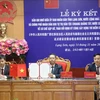Hanoi (VNS/VNA) - The risk of a coal shortage and high input material prices have affected thermal power businesses, while hydropower enterprises are expected to benefit from the higher power selling prices compared to last year.
According to Agribank Securities Company (AGR), the first quarter of this year saw a lack of 300MW of thermal power due to a coal shortage. The risk of a coal shortage in the coming months has forced factories to actively seek imported coal sources to supplement output. However, because coal prices are limited by Vietnam Electricity (EVN), businesses will face difficulties in negotiating prices with foreign suppliers to ensure profit margins for factories.
Although the profit margin of power enterprises is fixed under power purchase agreements (PPAs), the competitiveness of coal-fired power plants using imported coal and gas turbines will be lessened in the competitive electricity generation market.
This means coal-fired power enterprises face difficulties, while the advantage belongs to hydropower enterprises. The high probability of a positive hydrological situation in the coming months will support the continued growth of hydropower enterprises.
International Research Institute for Climate and Society (IRI) predicts that La Nina will likely weaken in July-August and become strong again from September onwards. This can cause heavy rainfall in the central western Pacific region including Vietnam.
The Center for Hydro-meteorological Forecasting also forecasts that there will be more rain in the North and North Central regions in July, August, September; and more in the Central and South Central regions in September, October and November.
Previously, La Nina was active again in the first half of this year, especially in May-June.
Hydroelectricity plants used up to 50% of their capacity continuously from the end of May to the beginning of June during the noon peak hours and more than 90% of their capacity during the evening peak hours.
Analysts at Vietcombank Securities Company (VCBS) said that hydropower enterprises will continue to benefit until 2023 when they can maximise output in case La Nina lasts through the winter of this year. Notably, hydropower plants in the North and North Central region will benefit greatly when their generation output increases sharply over the same period last year.
Hydropower has recently contributed to profit margin and cash flow for businesses with diverse power plant portfolios and multi-industry businesses.
Like Ha Do Group, revenue from the electricity segment grew by 97% in Q1, reaching 477.7 billion USD (20.5 million USD) in which Dak Mi 2 Hydropower Plant regularly exceeds 20-50% of the monthly plan.
Two hydropower plants in Quang Nam province including Dak Mi 2 and Song Tranh 4, along with the 7A Wind Power Project with a capacity of 50MW are the main drivers of Ha Do revenue and profit growth. Currently, its subsidiaries are operating 314MW of hydroelectricity, 50MW of wind power and 98MWp of solar power.
At Refrigeration Electrical Engineering Company (REE), the hydropower segment accounted for a large proportion of the total electricity portfolio at subsidiaries and associated companies. Therefore, analysts expect this to continue to be the main contributor to business results until the end of the year.
The hydropower capacity of this enterprise is currently over 480MW, with most of the plants located in the Central, Central Highlands, and Southern regions. Previously, REE Energy Company (REE Energy) increased its ownership in Vinh Sơn-Sông Hinh Hydropower Company (VSH) to 50.5%.
According to REE Chairwoman Mai Thanh, raising ownership to a controlling stake allows REE to participate more actively in VSH's strategic decisions. The Thuong Kon Tum hydropower plant project officially came into operation in April 2021 after more than 12 years of construction and contributed more than 976 million kWh of electricity output by the end of 2021.
Regarding coal-fired power, REE has significantly reduced its investments under the initiative of the Global Joint Declaration on the shift from coal to clean energy that Vietnam has committed to at COP26. Specifically, REE has reduced its ownership in Quang Ninh Coal Thermal Power Company (QTP) from 8.04% to only 0.98% and is expected to divest the rest in the near future./.
According to Agribank Securities Company (AGR), the first quarter of this year saw a lack of 300MW of thermal power due to a coal shortage. The risk of a coal shortage in the coming months has forced factories to actively seek imported coal sources to supplement output. However, because coal prices are limited by Vietnam Electricity (EVN), businesses will face difficulties in negotiating prices with foreign suppliers to ensure profit margins for factories.
Although the profit margin of power enterprises is fixed under power purchase agreements (PPAs), the competitiveness of coal-fired power plants using imported coal and gas turbines will be lessened in the competitive electricity generation market.
This means coal-fired power enterprises face difficulties, while the advantage belongs to hydropower enterprises. The high probability of a positive hydrological situation in the coming months will support the continued growth of hydropower enterprises.
International Research Institute for Climate and Society (IRI) predicts that La Nina will likely weaken in July-August and become strong again from September onwards. This can cause heavy rainfall in the central western Pacific region including Vietnam.
The Center for Hydro-meteorological Forecasting also forecasts that there will be more rain in the North and North Central regions in July, August, September; and more in the Central and South Central regions in September, October and November.
Previously, La Nina was active again in the first half of this year, especially in May-June.
Hydroelectricity plants used up to 50% of their capacity continuously from the end of May to the beginning of June during the noon peak hours and more than 90% of their capacity during the evening peak hours.
Analysts at Vietcombank Securities Company (VCBS) said that hydropower enterprises will continue to benefit until 2023 when they can maximise output in case La Nina lasts through the winter of this year. Notably, hydropower plants in the North and North Central region will benefit greatly when their generation output increases sharply over the same period last year.
Hydropower has recently contributed to profit margin and cash flow for businesses with diverse power plant portfolios and multi-industry businesses.
Like Ha Do Group, revenue from the electricity segment grew by 97% in Q1, reaching 477.7 billion USD (20.5 million USD) in which Dak Mi 2 Hydropower Plant regularly exceeds 20-50% of the monthly plan.
Two hydropower plants in Quang Nam province including Dak Mi 2 and Song Tranh 4, along with the 7A Wind Power Project with a capacity of 50MW are the main drivers of Ha Do revenue and profit growth. Currently, its subsidiaries are operating 314MW of hydroelectricity, 50MW of wind power and 98MWp of solar power.
At Refrigeration Electrical Engineering Company (REE), the hydropower segment accounted for a large proportion of the total electricity portfolio at subsidiaries and associated companies. Therefore, analysts expect this to continue to be the main contributor to business results until the end of the year.
The hydropower capacity of this enterprise is currently over 480MW, with most of the plants located in the Central, Central Highlands, and Southern regions. Previously, REE Energy Company (REE Energy) increased its ownership in Vinh Sơn-Sông Hinh Hydropower Company (VSH) to 50.5%.
According to REE Chairwoman Mai Thanh, raising ownership to a controlling stake allows REE to participate more actively in VSH's strategic decisions. The Thuong Kon Tum hydropower plant project officially came into operation in April 2021 after more than 12 years of construction and contributed more than 976 million kWh of electricity output by the end of 2021.
Regarding coal-fired power, REE has significantly reduced its investments under the initiative of the Global Joint Declaration on the shift from coal to clean energy that Vietnam has committed to at COP26. Specifically, REE has reduced its ownership in Quang Ninh Coal Thermal Power Company (QTP) from 8.04% to only 0.98% and is expected to divest the rest in the near future./.
VNA























